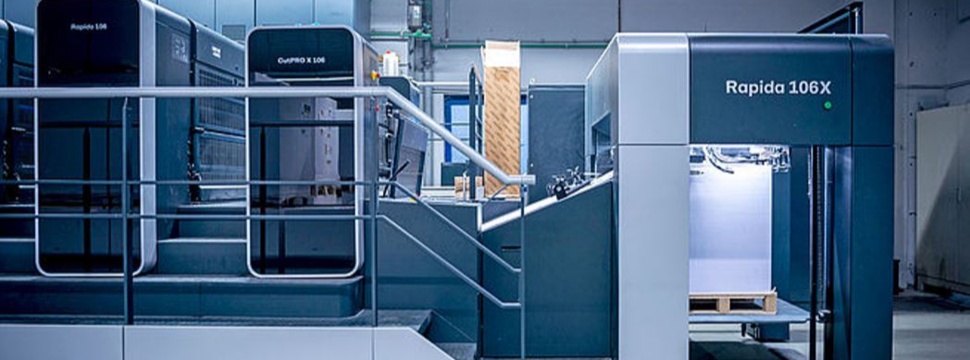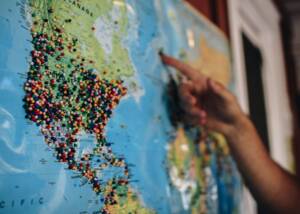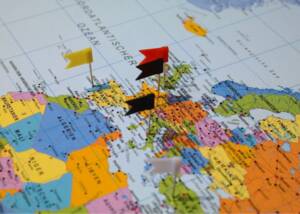Complex Rapida 106 X installation at one of the German market leaders in dialogue marketing
News General news
“This press reflects SDV's attitude to life”

- First installation of sheetfed offset technology from Koenig & Bauer at the company
- Rapida 106 X and CutPRO X in one
- Production speed 20% higher: perforating, printing and finishing at up to 15,000 sheets per hour
- 280 million direct mail products per year
In autumn last year, a new Rapida 106 X started production at SDV in Dresden. This high-end medium-format installation (max. sheet format 740/750 × 1,060 mm) is more than just a latest-generation sheetfed offset press: a fully equipped CutPRO X rotary die-cutter unit for creasing and cutting the print products has been integrated ahead of the printing units. It is followed by eight printing units with a convertible perfecting unit for 4-over-4 production, as well as a coater and extended delivery. This configuration allows the press to realise fully automated inline production of high-quality finished direct mail products, all in a single pass.
Franz Schiederer, one of the company’s two managing directors, explains: “This press reflects SDV's attitude to life. It is innovative and contributes to the future viability of our company.” It is seen as a ‘must-have’ for an information logistics specialist whose primary value chains are found in other fields. Complex print products can be realised in a single production run and with fewer staff. This, in turn, optimises logistics, saves intermediate storage space, and achieves shorter production cycles with lean processes.
High proportion of perforated products
Some 80 per cent of the print products require perforations, mainly for detachable postcards or coupons. This high proportion was also the reason for integrating a full-featured CutPRO X unit into the printing press. One of decisive advantages of the die-cutting unit is the fast makeready. At around five minutes, the makeready time is comparable to that for a job changeover on the printing and coating units. At the same time, it is also possible to re-use the die-cutting formes.
The maximum production speed when using the die-cutting unit is 15,000 sheets per hour. It is only when especially demanding substrates, such as lightweight papers, are used that the Rapida 106 X runs a little slower. Alongside the high production speed, which is around 20 per cent higher than the press that was previously installed, SDV enjoys the benefits of the exceptionally short stops for makeready. The managing director's overall impression is that production has become “more stable and more efficient” since using the Rapida 106 X.
And this is a good thing, because dialogue marketing is another field where today's jobs are shorter and more diverse than they were in the past. This makes makeready times and high flexibility essential concerns.
Market-leading technology
One of the important equipment features of the Rapida 106 X is QualiTronic PDFCheck. The measuring and control system not only monitors the print quality of every single sheet, but also inspects each sheet and compares the printing results with the PDF from pre-press. “This capability is the key to loss-free production, despite the high level of price pressure,” says Franz Schiederer. “Not to mention the outstanding quality from start to finish.”
The innovativeness that the market-leading measuring and control system embodies, together with many other technical highlights such as the sidelay-free infeed DriveTronic SIS, convinced the decision-makers at SDV that they wanted this press. Accordingly, the company has invested in its first Rapida from Koenig & Bauer. With a feature list tailored precisely to the company’s needs, the press promises to provide maximum benefits – and this long into the future. The close proximity to the manufacturer is an additional advantage. Along with its technological prowess, the Rapida 106 X is a veritable eye-catcher, making it the perfect fit for a print service provider seeking to offer its staff the best possible workplace and cutting-edge technology.
Working with three printing processes
SDV has been active in direct and dialogue marketing since 2003, with three companies at two production locations (in Dresden and in Weidenberg near Bayreuth). 280 million direct mail products leave the company every year – and there is no end to the growth in sight. Production is carried out on digital, sheetfed and web offset presses. Four criteria determine which process is chosen: format, substrate weight, run length and product design details.
The customer base that SDV caters to is highly diverse. Mail-order retailers, financial services providers, energy utilities, insurance companies, travel companies and their agencies, and representatives of many other branches are to be found among the clients, including 13 DAX-listed companies. They all benefit from the fact that their printed products for dialogue marketing are produced exclusively by a German company certified to ISO 9001 and ISO 27001 (which covers requirements for information security management). And this absolute data security goes hand in hand with high quality standards and what could well be the unique character of the products themselves.
Another significant factor is the dependability of SDV as a business partner. In addition to the technical design, printing, personalisation/individualisation and distribution optimisation of direct mail products, SDV offers clients a multitude of further opportunities to reach their customers by means of targeted and location-specific digital channels.
Special attitude to life
The production volume handled in Dresden has increased noticeably since installation of the Rapida 106 X, and the two locations now account for around half of all value creation. This is also reflected in the size of their workforces: Both Dresden and Weidenberg count 115 employees. Turnover amounts to between €30 million and €32 million.
Many clients are rather surprised when they visit one of the two companies for the first time, for example to witness the start of production of their products – not only in regard to the modern technical facilities, but equally by the architecture of the buildings. The futuristic outward appearance extends into the offices and even many of the production areas.










